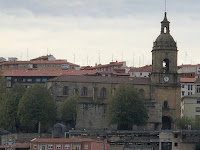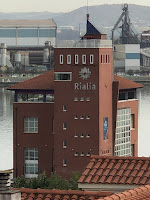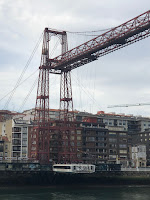 Bilbao (Bizkaia in Basque) is located in north-central Spain; about an hour's flight from Madrid. With about 347.000 inhabitants it is the country's tenth largest city. Although the greater metro area is home to more than a million people. Bilbao is also the largest city in the Basque Country.
Bilbao (Bizkaia in Basque) is located in north-central Spain; about an hour's flight from Madrid. With about 347.000 inhabitants it is the country's tenth largest city. Although the greater metro area is home to more than a million people. Bilbao is also the largest city in the Basque Country.

It was founded in 1300 by Diego López V de Haro. It thrived as a port city for Basque wool and iron.

Heavy industrialisation took place in the 19th and 20th centuries.
 During the Spanish Civil War, Bilbao was bombed heavily by Spanish and German planes and then the city was besieged.
During the Spanish Civil War, Bilbao was bombed heavily by Spanish and German planes and then the city was besieged.
 Today, the city is an architectural mishmash of Gothic, Art Deco, Art Nouveau, Neo-Gothic and contemporary styles with 17 bridges and 18 public parks providing 200 ha (490 acres) of green space. In 2014, Bilbao became a UNESCO City of Design.
Today, the city is an architectural mishmash of Gothic, Art Deco, Art Nouveau, Neo-Gothic and contemporary styles with 17 bridges and 18 public parks providing 200 ha (490 acres) of green space. In 2014, Bilbao became a UNESCO City of Design.
 Most of Old Town is a pedestrian zone. In the middle is the Fountain of Dogs which dates back to the 1800s. The water spouts used to resemble Egyptian-style lions but over the years they have faded and today look more like dogs.
Most of Old Town is a pedestrian zone. In the middle is the Fountain of Dogs which dates back to the 1800s. The water spouts used to resemble Egyptian-style lions but over the years they have faded and today look more like dogs.

The Plaza Nueva was built in 1821. There's a government building and the Royal Academy of the Basque Language.
 Santiago Cathedral was built in the 14th to 15th centuries and it was the city's main parish church. It was declared a Roman Catholic cathedral in 1950. In 1993 it was designated a UNESCO World Heritage Site.
Santiago Cathedral was built in the 14th to 15th centuries and it was the city's main parish church. It was declared a Roman Catholic cathedral in 1950. In 1993 it was designated a UNESCO World Heritage Site.
The Teatro Arriaga is the opera house built in 1890. It was destroyed in a flood in 1983 and rebuilt in 1985.

 The Church of San Antón is a Catholic Church that was built in 1510. Since 1984 is has been a Spanish National Historic-Artistic Monument.
The Church of San Antón is a Catholic Church that was built in 1510. Since 1984 is has been a Spanish National Historic-Artistic Monument.

Next to the church is the San Antón Bridge. It is the city's oldest bridge dating back to 1318. It has been rebuilt several times following floods and in 1937 it was rebuilt following damage during the Spanish Civil War.
 The Ribera Market sits on the right bank of the Nervion River. It is 10.000 square metres (110,000 sq feet), making it the biggest covered market in Europe. There are more than 60 merchants selling meat, shellfish, produce, and cheeses.
The Ribera Market sits on the right bank of the Nervion River. It is 10.000 square metres (110,000 sq feet), making it the biggest covered market in Europe. There are more than 60 merchants selling meat, shellfish, produce, and cheeses.
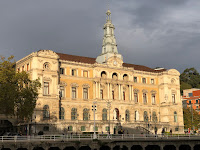 The Bilbao City Hall building was completed in 1892.
The Bilbao City Hall building was completed in 1892.

The Church of San Nicolás took 13 years to build and it opened in 1756.

The Zubizuri, "white bridge", was built in 1997. The bridge has a curved walkway and the deck is made of translucent glass bricks.

Moyúa, "Elliptic Square", was built in 1876 and refurbished in the 1940s with French and English style gardens. It was rebuilt in 1997 following six years of construction of the city's subway.
 The Iberdrola Tower opened in 2012. It is 165 metres (541 feet) tall and is the tallest building in the Basque Country and the eighth-tallest in Spain.
The Iberdrola Tower opened in 2012. It is 165 metres (541 feet) tall and is the tallest building in the Basque Country and the eighth-tallest in Spain.
 The church of the Incarnation was consecrated in 1526. It is run by Dominican nuns and it also contains the Diocesan Museum of Sacred Art.
The church of the Incarnation was consecrated in 1526. It is run by Dominican nuns and it also contains the Diocesan Museum of Sacred Art.
 The Princes of Spain Bridge, also called the La Salve Bridge, was built in the 1970s.
The Princes of Spain Bridge, also called the La Salve Bridge, was built in the 1970s.

Mount Artxanda is one of the city's two small mountain ranges. The funicular to the top opened in 1915.
 It only takes 3 minutes to go to the top where there is a park and great views of the city.
It only takes 3 minutes to go to the top where there is a park and great views of the city.

Maman is a bronze mama spider sculpture that was made in 1999. It is almost 9 meters (about 30 feet) tall. The original debuted at the Tate Museum in
London and this is one of six on permanent display.
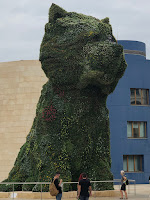 Puppy is a 12,4 metre (40.7 feet) tall still sculpture of a West Highland terrier carpeted with 38.000 plants. The petunias, impatiens, marigolds and begonias get replaced twice a year. It first exhibited in Germany in 1992 and in 1997 it was purchased for the opening of Guggenheim Museum.
Puppy is a 12,4 metre (40.7 feet) tall still sculpture of a West Highland terrier carpeted with 38.000 plants. The petunias, impatiens, marigolds and begonias get replaced twice a year. It first exhibited in Germany in 1992 and in 1997 it was purchased for the opening of Guggenheim Museum.
 The Guggenheim Museum was designed by Canadian architect Frank Gehry and it opened on 19 October 1997. It cost $89 million to build and it is one of the biggest museums in Spain. Its permanent collection focuses on visual arts of the second half of the 20th century and the present.
The Guggenheim Museum was designed by Canadian architect Frank Gehry and it opened on 19 October 1997. It cost $89 million to build and it is one of the biggest museums in Spain. Its permanent collection focuses on visual arts of the second half of the 20th century and the present.
Here's a three minute video I found on YouTube about it.

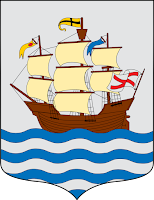 In the 1300's, its port competed with Bilbao but fell behind when Bilbao's port was grated trade privileges in 1511.
In the 1300's, its port competed with Bilbao but fell behind when Bilbao's port was grated trade privileges in 1511. 